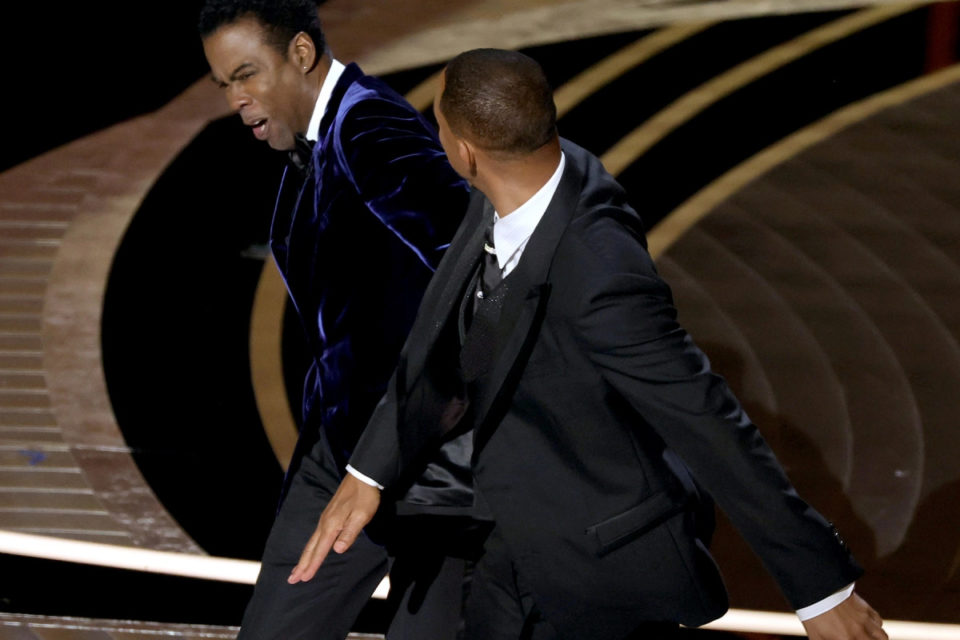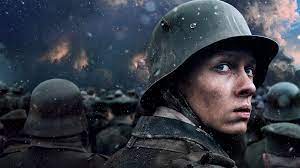What to Watch This Weekend: ‘Taj,’ ‘All Quiet On The Western Front’ and Chris Rock Addressing ‘The Slap’
The list covers an Oscars controversy, an Oscars favorite, and a show about Emperor Akbar’s family woes

(L-R) Chris Rock and Will Smith are seen onstage during the 94th Annual Academy Awards at Dolby Theatre on March 27, 2022 in Hollywood, California. Photo: Neilson Barnard/Getty Images
Chris Rock on Will Smith’s selective outrage, Meghan Markle’s in-law woes, and the pretensions of Lululemon’s $100 ‘anti-racist’ yoga pants
Chris Rock: Selective Outrage
Streaming on: Netflix
Rating: ***1/2
In preparation for the Oscars on March 13, I watched Chris Rock: Selective Outrage. Mostly it was in anticipation of Rock finally addressing what’s come to be known as ‘The Slap,’ or Will Smith’s Great Unraveling. I wasn’t disappointed.
There have been several scandals in the Oscars’ 95-year-long history, including a streaker on the stage, Marlon Brando refusing to accept the trophy for his performance in The Godfather, the Moonlight-La La Land envelope drama, and Adrian Brody kissing a stunned Halle Berry full-on, on the mouth in his excitement at winning the Oscar for his performance in The Pianist. But none of it comes even close to the shocking moment last year when Jada Pinkett Smith rolled her eyes on presenter Chris Rock’s hairy joke and her husband, Will Smith, walked onto the stage to offend in her honor.
The steady dignity and professionalism with which Rock handled the assault and went on to anchor the rest of the show made him stand out as a much classier man than the much bigger star who let his fragile ego and machismo get the better of him.
For a year since that moment, Rock has not said much about ‘The Slap,’ though he did drop hints that he will, eventually, if he were paid for it.
He has been, by Netflix, and during his one-hour long stand-up show – shot earlier this month in front of a live audience in a theatre in Baltimore, Jada Smith’s hometown – he did.
Rock appeared in all white and in top form. Speaking as he always does, he was outrageous, funny and mocking. He ripped into vacuous political correctness, took swipes at all and punctuated almost every line with his favorite expletives.
Rock began his show with poking at ‘woke traps’ and the hypocrisy of self-conscious, high-end brands and their pretentious sales pitches, specifically Lululemon’s ‘anti-racist’ $100+ yoga pants. Then he got personal, attacking Meghan Markle for constantly playing the victim.
“It’s not all racist, a lot of it is just in-law s***,” Rock said to loud cheers, clapping and head nods.
In between cracking jokes about the Kardashians, white folk, Elon Musk, himself and even his daughter, Rock kept referring to the Oscar incident, but didn’t dwell on it. He spoke instead of sex, money, race, women, being single, why he prefers dating younger women, and abortion. In the middle, for a while, some of his jokes didn’t land. Either they were not funny, or just uncomfortably bad.
But as Rock revved up to sign off, saying he took the slap like “[Manny] Pacquiao,” he talked about the infamous “Jada Smith’s entanglement,” and while calling out the Smiths for airing their dirty marital linen in public, he aired their dirty marital linen in public.
“His wife was [having sex with] her son’s friend. I normally would not talk about this s***, but for some reason, [they] put that s*** on the internet,” Rock said. “We’ve all been cheated on. None of us have ever been interviewed by the person we cheated on, on television. She hurt him way more than he hurt me,” he added.
And then he finally spoke of what had really happened between him and Mrs Smith years ago – apparently, after Will Smith’s film, Concussion, did not get an Oscar nomination, Jada Smith asked Rock to quit hosting the show. Eyes rolled and some jaws dropped in the audience.
The show’s last segment was sharp, raw, funny and emotional, and Rock’s mic drop was a moment like none other.
Watch Chris Rock: Selective Outrage because it calls out that horrible moment at the last Oscars for what it was. Entitled indignity.

‘Taj’ is well made, has a fabulous cast, some sexy scenes, and shows how zealots have always exerted themselves to try and grab the strings to power
Taj: Divided By Blood
Cast: Naseeruddin Shah, Dharmendra, Aditi Rao Hydari, Sandhya Mridul, Rahul Bose, Sandhya Mridul, Ashim Gulati, Taaha Shah, Zarina Wahab, Shubham Kumar Mehra
Direction: Ron Scalpello, Ajay Singh
Streaming on: ZEE5
Rating: ***1/2
Some desis got together with some gore log to create a 10-episode series on the story of Jalal-ud-din Muhammad Akbar’s succession drama and the battle for Hindustan’s throne. The result is a show that tells a gharelu story on a grand, royal scale with women in jadaau jewelry and men in long, pleated frocks.
Taj, directed by British director Ron Scalpello and Ajay Singh, is mostly compelling, though its middle drags and bores a bit.
The series, set in the 16th century, begins with an aging Akbar at the Red Fort, his three wives (Jodha Bai played by Sandhya Mridul, Salima by Zarina Wahab, Ruqaiya by Padma Damodaran) in the zanana, and his three jawan barkhurdaars.
There’s Salim (Aashim Gulati), who is always drunk, wrapped around women, and has no interest in becoming the king. Then there’s Murad (Taha Shah Badussha), who is quite barbaric and is always itching to fight and quickly settle who will sit on the throne after Akbar. And finally there’s Daniyal (Shubham Kumar Mehra), religious, gay and seemingly uninterested in raj gaddi.
Akbar, at the end of his life and often his tether, is a lovely, sad man. Din-e-Illahi, his intellectual attempt at creating a secular state and equality for all, irrespective of the religion they follow, has flopped miserably. His Navratnas have dwindled to five, there’s little sane counsel but lots of intrigue and conspiratorial whispers in the corridors of his palace. And outside, there’s Rana Pratap, king of Mewar, having recovered Chittorgarh post-Haldighati and refusing to bow to the Mughals, and Akbar’s brother Mirza Hakim (Rahul Bose) who has rebelled in Kabul.
Between battles won, relatives imprisoned, minds poisoned, Akbar weighs the pros and cons of each potential candidate, but none of his three sons seem fit for the job. One is too close to bigots, the other is always baying for blood and Salim is mostly lying on his four-poster bed, lost in the nasha of sharab and shabab.
In the zanana, all women have an opinion and a favorite candidate to be king. So a worried Akbar announces that succession will be decided by merit and not age, and seeks some emotional relief in a secret room where a nymph-like lady is hidden away. The lady simpers and says she wants to be set free, but Akbar says he is lachar.
As the ideal candidate for king goes bonkers and starts pursuing a woman he must not have, one brother keeps crying for his ammi and becomes a pawn of men whose intent is malevolent. And the third keeps killing, too many people die, leaving one son and his daddy to settle the final score.
Taj is well made, has a high production value, and its casting is quite fabulous. The series, which basically tells a story about love and egos, has some sexy scenes, and some serious incestuous stuff as well. There are also battles, familial and other showdowns. But all of this is encased in a story that may be about the future of Hindustan but plays out like a gharelu kalesh.
Though the series drags when the brothers start fighting among themselves and things become too gharelu and silly, Taj holds because of the actors.
The series has an excellent ensemble cast led by Naseeruddin Shah who plays Akbar as a wise, frail, egoistic, consensual, well-meaning but ziddi man.
But it’s the three actors cast as three brothers who take the show forward. They are all very good, but Salim played by Aashim Gulati and Daniyal played by Shubham Kumar Mehra are memorable.
I enjoyed Taj because in these times, when there are attempts at erasing history, the show creates believable characters with humanity and shades of grey against a fictionalized historical backdrop. And because the series doesn’t shy away from showing how zealots have always exerted themselves to try and grab the strings to power.

The film which will bag an Oscar or more for Ukraine’s sake
All Quiet On The Western Front
Cast: Felix Kammerer, Albrecht Schuch, Daniel Bruhl, Devid Striesow
Direction: Edward Berger
Rating: ***1/2
Streaming on: Netflix
Nominated in nine Oscar categories, including Best Picture, All Quiet On The Western Front is a German remake of the 1930 black-and-white film which was based on Erich Maria Remarque’s 1928 novel. The original film, directed by Lewis Milestone, got two Oscars – Best Director and Outstanding Production.
That may well be the case with Edward Berger’s film on March 13th at the Dolby Theatre. Though Berger’s anti-war film – made at a time when the world is both shocked and fatigued as it continues to watch Ukraine’s bombardment and devastation on a daily basis – might bag more awards, including for best sound and cinematography. I can’t really visualize any acceptance speech for any other film where a more meaningful shout-out will go out Ukraine and Volodymyr Zelenskyy.
Berger, who directed the five-part miniseries Patrick Melrose starring Benedict Cumberbatch, had made an almost two-and-a-half-hour long film, that doesn’t have any flab and its length is a cinematic device to convey the relentlessness and exhaustion of battles, the stupidity of wars.
Set in 1917, during World War I, the film follows four young, new recruits into the German Army as they are plunged into a battle with the French on the Western Front.
As the film follows these men into the trenches on the battlefield, its focus is on the harrowing tragedy of war. The film has stunning battle scenes, an ominous soundtrack in between as it showcases the desperation of soldiers for food and the randomness of death.
The film has several sequences where we watch an egoistic, psychopathic general who orders men to battle while having lavish meals in plush homes and offices. These are always men who have fought no wars, but seek personal glory from devastation.
It’s a powerful film, but not as powerful as the 1930 original.







